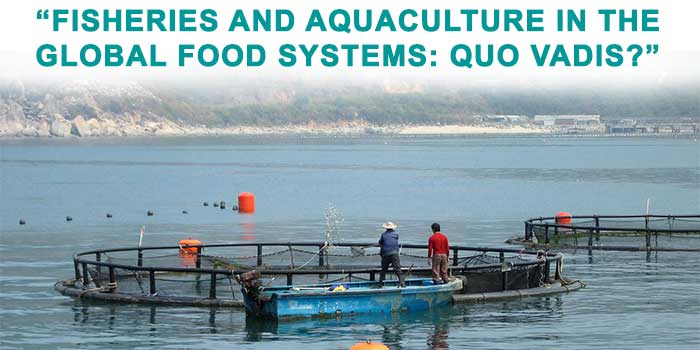“FISHERIES AND AQUACULTURE IN THE GLOBAL FOOD SYSTEMS: QUO VADIS?”
Great many people on earth still face poverty, hunger, and disease. The challenge is to end hunger and poverty, improve nutrition and health while making agri-food systems sustainable. Urbanization, population increases, and income growth are driving higher demand for food, amidst agriculture faces significant natural-resource constraints and climate change. Fish has become an integral commodity of this increasing demand and projected to create significant demand-supply gaps around the world. The global population is projected to grow up to almost 9.8 billion by 2050, with most of that growth in the developing regions of Africa and Asia. Feeding the world by 2050 will require a 50 percent increase in the production of food. These increases have implications for agri-food systems unless they adapt significantly to become more productive and diversified while coping with unprecedented climate change and natural resource constraints. Producing more with less, while preserving and enhancing the livelihoods of farmers, is a global challenge. Beyond the increase in production to reduce hunger, the role of food and food systems should be to improve nutrition, health, livelihoods and wellbeing of people, especially the rural poor, women and children, thus incorporating fish (aquatic animal foods), into agri-food systems, is important and timely.
Food systems, in general, are changing rapidly with changing diets. Today’s Agri-Food Systems are too focused on food quantity and not enough on quality. They neither help consumers to make healthy and affordable food choices consistent with optimal nutrition outcomes nor provide equitable and socially responsible life opportunities for rural farmer’s farmer communities in an environmentally sustainable manner. Thus, there is a need for the policy makers and private sector to work together to reshape agri-food systems in ways that will advance the goal of sustainable food systems, improved livelihoods and healthier diets for all.
Efforts into including FISH into Agri-Food Systems to improve nutrition and livelihoods of rural poor smallholders and their communities are timely. Policy interventions are necessary to achieve this. Policy makers need to ensure that all parts of fish agri-food systems work together. This means thinking well beyond agriculture to also consider the many processes and activities involved in food production, processing, storage, transportation, trade, transformation and retailing. This amounts to a change in mindset and a fundamental shift in approach.
To meet growing nutritious fish-food demand, it is necessary to develop more productive, targeted, nutrition sensitive and sustainable farming systems, with low environmental impacts and reduced greenhouse gas emissions. Public goods and services are needed to facilitate business in the fish-food system and along the urban-rural spectrum. Improving infrastructure, reducing the costs of doing business, providing incentives for investment, and creating conditions for the development of inclusive economic activities in the fish-food system, is a state responsibility. Aquaculture needs substantially increased investment to meet the growing demand for fish-food, adjust to changing dietary patterns and make farming systems sustainable.
Small-scale producers need the support of policy frameworks to invest in productivity-enhancing technologies and sustainable farming practices. Targeted research and resulting inputs are essential for the sustainable transformation of fish-food systems. Quality inputs such as better seeds, better feeds, better health services, are all essential to strengthen fish-food systems. Creating market access and harnessing the private sector investment to leverage alleviating poverty, improving rural nutrition and empowering women is an achievable challenge. The economic development of rural areas is not only important because most of the poor and hungry live there, but also because broad-based rural economic development is a powerful force for change. Investing in rural economies will strengthen fish-food systems and help to achieve sustainable development goals of ending hunger and poverty.
Let’s discuss about this more at the 7th International Conference on Aquaculture and Agriculture (ICFA 2020) organized by the International Institute of Knowledge Management (TIIKM) in partnership with the Department of Fisheries, Ministry of Agriculture and Cooperatives, Thailand and the Asian Institute of Technology (AIT), Thailand, from 27th-28th November 2020. The key intention of ICFA 2020 is to facilitate fisheries and aquaculture stakeholders, including producers, traders, consumers, researchers, policy makers, NGOs, to analyze the trends in global fisheries and aquaculture, with the view to better understand its contribution and place within the global food systems, and to develop some consensus build recommendations for the future.
CONFERENCE TRACKS
- Aquaculture development
- Aquaculture engineering
- Feeding and nutrition in Aquaculture
- Aquatic resources and environmental management
- Aquaculture and Fisheries economics
- Biotechnology and genetics
- Aquatic health management and diseases
- Aquaculture, human nutrition and health
- Aquaculture for alleviating poverty
- Environmental impacts of aquaculture and/or fisheries
- Fish Biology: Immunology, Physiology & Pathology
- Fisheries, aquaculture and climate change
- Fisheries management, policy, and governance
- Marine biology, oceanography, and conservation
- Post-harvest technology and value addition
- Supply chain management in aquatic products
- Quality Assurance in Aquaculture
- Cage farming
- Micro and macro algae farming
- Aquaculture of ornamental species
Visit: https://aquaconference.com/
Concept prepared by

– DR. ROHANA SUBASINGHE –
Former – President (WAS – APC)

